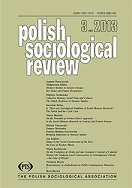On the Usefulness of Aleida and Jan Assmann’s Concept of Cultural Memory for Studying Local Communities in Contemporary Poland—the Case of Olsztyn
On the Usefulness of Aleida and Jan Assmann’s Concept of Cultural Memory for Studying Local Communities in Contemporary Poland—the Case of Olsztyn
Author(s): Marta KarkowskaSubject(s): Social Sciences
Published by: Polskie Towarzystwo Socjologiczne
Keywords: Cultural memory; collective memory; local community; town; Polish society
Summary/Abstract: The goal of this article is to review the possibilities and limitations of applying Aleida and Jan Assmann’s concept to the study of local memory, using as an example the memory of inhabitants of the Polish town of Olsztyn. The author first briefly presents selected key premises of Aleida and Jan Assmann’s concept of culturalmemory. She then addresses the question of how the Assmanns’ concept is received and interpreted in Poland. Discussion of these issues leads to an analysis of the advantages and difficulties of applying the two German scholars’ theoretical proposals to the study of memory in local communities. The author refers to the case of a moderately aggregated, urban society with a complicated multiethnic past. Her conclusions concern the challenges scholars face in adopting Aleida and Jan Assmann’s theoretical perspective for studying memory and local communities in this part of Europe.
Journal: Polish Sociological Review
- Issue Year: 183/2013
- Issue No: 3
- Page Range: 369-388
- Page Count: 19
- Language: English

